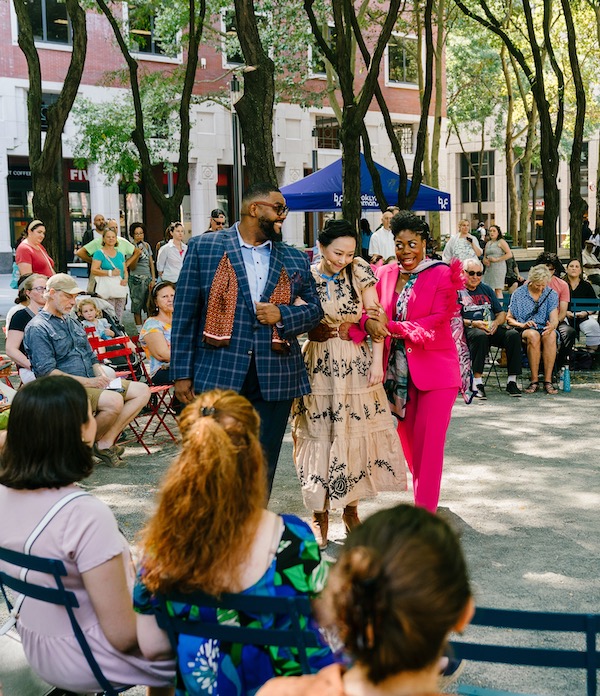‘Monumental Travesties’ at Mosaic Theater Company makes the vandalism of a controversial statue a source of comedy
Review by Peter Marks for The Washington Post

What says ally-ship quite like a White man with Black Lives Matter emblazoned on his tighty whities? It’s a question you’ve probably never thought of asking. But playwright Psalmayene 24 nevertheless seeks to answer it — er, cheekily — in “Monumental Travesties,” the entertainingly transgressive comedy getting a world premiere by D.C.’s Mosaic Theater Company.
Psalmayene 24 (nee Gregory Morrison) has written an absurdist three-character satire poking fun at all the pieties about race, especially as espoused by White liberals looking for absolution from their Black friends and associates. The subject is as ripe for ribbing today as was sending up Archie Bunker’s bigotry on “All in the Family” in the 1970s. Some of Psalmayene’s plot contrivances, in fact, reflect the blatantly cringe-making pivots of vintage sitcoms.
But the conventions of bygone TV comedy provide a surprisingly safe space for a subject around which thoughtful people still tread lightly (even if Psalmayene and Reginald L. Douglas, his skillful director at the Atlas Performing Arts Center, might rethink the 90-minute play’s ending, which lands with a confusing thud).
“I grew up in a house that used to be a stop on the Underground Railroad!” protests Jonathan Feuer’s Adam, the overbearing White neighbor desperate to establish his worthiness to the Black couple (Louis E. Davis and Renee Elizabeth Wilson) next door. It is in the becoming D.C. home of Davis’s Chance and Wilson’s Brenda — brightly rendered by set designer Andrew R. Cohen — that “Monumental Travesties” takes place. And that’s where the story begins when Chance, a local activist/performance artist, bursts in the front door, bearing the head of Abraham Lincoln.
A real-life controversy inspires the mechanics of “Monumental Travesties”: Chance has severed Lincoln’s head from the Emancipation Statue in D.C.’s Lincoln Park, a monument dedicated in 1876 that in recent years has been decried as a humiliating depiction of White savior mentality. (Eleanor Holmes Norton, D.C.’s delegate in Congress, has introduced legislation to have it removed.) The statue features a godlike Lincoln astride a kneeling, formerly enslaved man in a loincloth — his servile gratitude could not be more apparent.

The giant head, by props designer Deb Thomas, sits on Chance and Brenda’s coffee table like an emblem of history’s ossified portrait of slavery from a White perspective; Chance’s vandalism is part of his campaign to “deconstruct symbols of White supremacy.” At one point, he enlists the compliant Adam in reversing the postures of the statue, having Adam prostrate himself before Chance in his living room. “So this is what it feels like, huh,” Chance remarks, “being White in America?”
The sharpest junctures of “Monumental Travesties” involve Chance and Brenda bearing witness to Adam’s outrageously self-serving platitudes. He’s so evolved, he insists, that he considers himself “un-White,” whatever that means, and so attuned to the injustices against people of color that he can recite from memory testaments to the indigenous Anacostan people on whose land his pricey townhouse sits. Chance and Brenda are not, for their part, above using Black victimhood to gain social and economic advantage: Brenda, for instance, concocts for Adam a shameful lie about a relative’s murder to explain the money she got to buy the house. (The truth, Psalmayene 24 implies, would be harder for a White person to believe.)
What’s also implicit in “Monumental Travesties” is the notion that conscientious people both Black and White still have to “act” for each other, that what they say in each other’s presence is a varnished version of what they really think. (Although the dramatist also points out that Brenda and Chance harbor problems and secrets, too, that they’re not willing to confront.) Chance’s absconding with Lincoln’s detached head is, in a sense, a cut to the chase about race: Talk isn’t good enough, he’s declaring, not even about the father of emancipation. Only action matters.
Davis, Wilson and Feuer demonstrate their acumen concerning broad comedy; their roles are archetypes, somewhat short of three dimensions, much the way sitcom characters are defined by a single trait recycled in one episode after another. Costume designer Moyenda Kulemeka gives pleasing pizazz to Brenda’s outfits, particularly the historic garb devised for the play’s final movement, when Brenda introduces another factual detail that complicates Chance’s facile rationale for his crime.
Under Douglas’s guidance, the actors amiably navigate the plot turns, which become ever crazier. The dramatist packs in so many curveballs that some are inevitably going to be wild pitches. (“Monumental Travesties” has to be the first play to use the brain fog resulting from long covid as a pivotal narrative point.) But even with some bumps, Psalmayene has paved a way for comedy to be another dramatic tool for understanding.
Monumental Travesties, by Psalmayene 24. Directed by Reginald L. Douglas. Set, Andrew R. Cohen; lighting, Alberto Segarra; costumes, Moyenda Kulemeka; sound Nick “the 1da” Hernandez. About 90 minutes. Through Oct. 8 at Atlas Performing Arts Center, 1333 H St. NE. mosaictheater.org.






